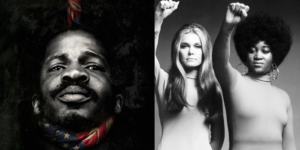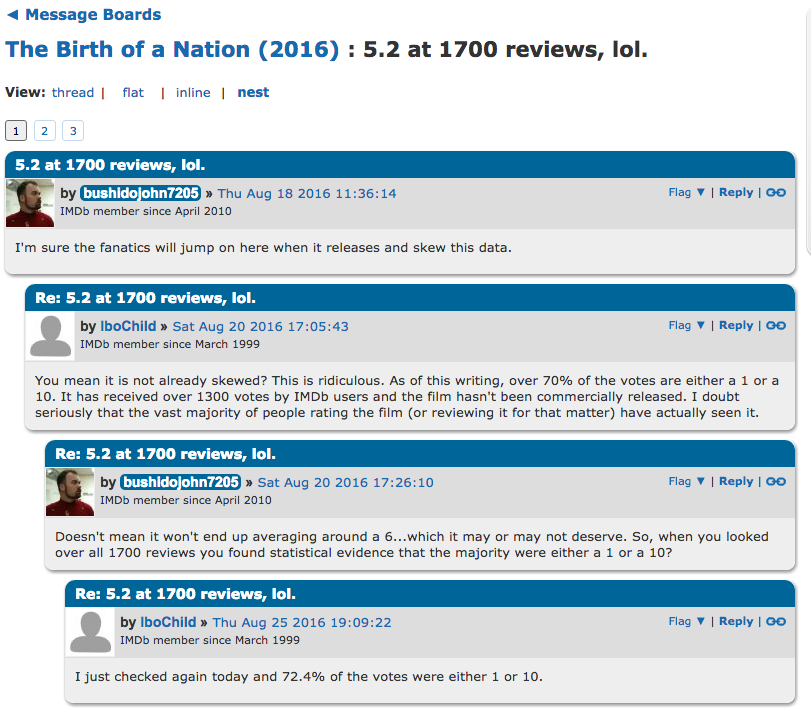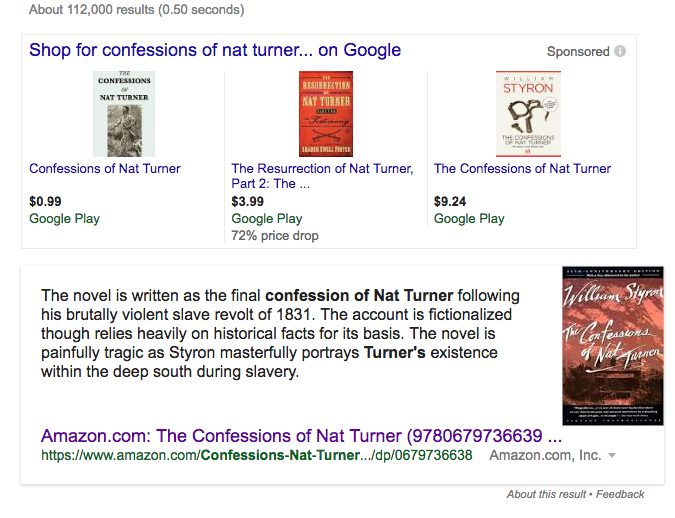[playwirevid id=”/5182687″]

“Black feminists,” black gossip bloggers, journalists and white supremacists who’d rather the original Birth of A Nation (1915), have bandwagoned to sabotage possibly one of the most meaningful and pioneering projects of our generation and unfortunately, we fed into it.
After watching the film’s assassination campaign online for many months, I couldn’t help but recall once upon a time when highly revered veteran Black feminist bell hooks, who has also found herself a target of social media neo-feminism, once confidently warned that:
“Negative stereotypes about the nature of black masculinity continue to overdetermine the identities black males are allowed to fashion for themselves. The radical subculture of black maleness that begins to emerge as a natural outcome of militant anti-racist activism terrified racist white America.
As long as black males were deemed savages unable to rise above their animal nature, they could be seen as a threat easily contained. It was the black male seeking liberation from the chains of imperialist white-supremacist capitalist patriarchy that had to be wiped out. This black man potential rebel, revolutionary, leader of the people could not be allowed to thrive.”
(We Real Cool: Black Men and Masculinity, 2004)
And as I sat in the theater watching Nate Parker’s once critically acclaimed now publicly tarnished Birth of A Nation film, I couldn’t help but think to myself that as a collective seeking to finally find our refuge, we’ve made a huge mistake. A mistake so huge it can’t be undone.
Despite my own patronizing of the film, the worldwide smearing of Nat Turner’s legacy had happened.
Not much long ago, Birth of A Nation was getting literal standing ovations and headed toward setting a precedent that we had never seen before. But things took a turn for the worse when journalistically irresponsible articles from Black gossip bloggers, via sites such as Bossip, BET and others, led to the public’s outrage and further digging into Parker’s past. Soon afterward, accusations of misogynistic statements and the legal documents of a rape case dating back to his college days at Penn State University where he was found not guilty, had resurfaced.
The world had began to turn on and cave in on Nate Parker. The much-anticipated film became the target of pretentious aggression overnight.
As an example, before the official bait-and-switch happened, user @fivefifths cosigns a post from another user, @mychalsmith, referring to the Birth of A Nation as a “good look”.
Here’s @mychalsmith discussing why Birth of a Nation is a good look despite concerns about “slave films” https://t.co/Z3tHOXVSj1
— Vann R. Newkirk II (@fivefifths) February 1, 2016
Then the same user goes on to say months later…
Birth of a Nation is a two-hour long film. It ain’t gonna save you. Cut it out.
— Vann R. Newkirk II (@fivefifths) August 16, 2016
Also user @MorganJerkins, who once openly expressed her lust for Parker, then went on to pen a condemning thinkpiece about him for The Atlantic.
@AVAETC @MorganJerkins It’s a hit piece on Nate Parker which stemmed from her finding out Nate’s wife was white. pic.twitter.com/DDRY44AcKW
— Dionne Bonds (@Stud_Kueen) August 24, 2016
As yet another example, popular Twitter user @feministajones posts this in support of the film.
We are going to make sure “Birth of a Nation” opens explosively!! #ImWithNat @ImWithNat @2LiveUnchained pic.twitter.com/IS3LfUvGWU
— I Will Block Ya Mama (@FeministaJones) July 23, 2016
Then just a few short months later, she decided to renege with this thread consisting of 20+ tweets which made both damaging and untrue claims about the film, its supporters and Nat Turner himself.
We seem to be more willing to believe & accept Nat Turner the “defender of Black women’s honor” than “Nat Turner, the man w/ Schizophrenia”
— I Will Block Ya Mama (@FeministaJones) October 7, 2016
…over the possibly “weak” truth
That the nigga was “crazy”
— I Will Block Ya Mama (@FeministaJones) October 7, 2016
To make matters worse, actress Gabrielle Union, who played a supporting role in the film, has been recently making media rounds giving the film’s antagonizers even more ammunition by encouraging boycotts of the film.
It wasn’t enough that these self-proclaimed “black feminists,” their irresponsible journalists, and cohorts who happen to have positions at outlets such as The Root, Ebony, Essence and other more major mainstream outlets like Variety,
On Aug. 25, user IboChild notes that 72.4 percent of the votes were either 1 or 10 prior to the commercial release of the film. The majority of the ratings being clearly negative due to its now 5.4/10 rating from 3,000+ users (The film was just released Oct. 7).
Also to note that very recently, there was some quarreling between Twitter users and journalists attempting to question the journalistic integrity of these Black liberal platforms participating in the media blitz, such as this article run by one of The Root’s senior editors, Yesha Callahan, who were only blocked and called names in response.
Twitter user @OckyJ83 and others had a brief exchange with Yesha and was blocked immediately, according to this update.
@TheRoot @YeshaCallahan and this was her response to my valid question ? pic.twitter.com/6k3zg0dc6T
— Doc Ock (@OckyJ83) October 10, 2016
And when well-known Black journalist Roland Martin mentioned The Root’s lack of journalistic integrity, Callahan unprofessionally tweeted a series of insults, including this one.
Your lack of neck & constant wearing of neck accessories distracts me from anything you ever have to say. https://t.co/5uV3H42xgs
— Yesha (@YeshaCallahan) October 10, 2016
She then goes on to tweet obscenities at another user when he calls her out about her unprofessionalism.
@NinerRon eat a dick.
— Yesha (@YeshaCallahan) October 11, 2016
Sidenote: With our very own black journalists publicly and unapologetically acting in this manner, it’s not hard to form the idea that much of the outrage surrounding this film stemmed from pretension.
Not to mention even pretentious and misinforming tweets from associates who encouraged those interested in the story of Nat Turner to read William Styron’s “The Confessions of Nat Turner” (1967). One of the main quarrels about this film was that it was “historically inaccurate.” Ironically, so is the book, as it is categorized as fiction on Amazon.com.
The Confessions of Nat Turner’s official Google description even says the following:
Or you can read Nat Turner’s confession. The Confessions of Nat Turner: The leader of the late insurrection in VA https://t.co/qYAUVkYxd3 https://t.co/qQsNT6t1mt
— Emiress of Dubai (@cindasmommy) October 8, 2016
But I guess I’m the only one who had to read it in 5th grade…Thanks, Ms. Adams.
— Yesha (@YeshaCallahan) August 16, 2016
Dear Nate Parker capers, I have already read the Confessions of Nat Turner. I didn’t need an inaccurate film to to teach me my history
— #FreeBresha (@nappy_techie) October 7, 2016
IM ANNOYED CUS I DID NOT READ THE CONFESSIONS OF NAT TURNER IN AP LITERATURE FOR NATE PARKER’S SILLY ASS TO GET THE MAN’S LIFE WRONG
— Jasmine Sanders (@JasMoneyRecords) October 7, 2016
So why do we need another? I find myself preferring to read “The Confessions of Nat Turner”
— Shaunie Baby! (@ShaunieBeeGee) October 3, 2016
You @FleurDeLaDay the confessions of Nat Turner is actually fiction. It’s not a real account
— PUBLIC (@PUBLIC_SOCIETY) October 7, 2016
I find this very interesting because Styron’s “The Confessions of Nat Turner” is a book that many credible scholars have criticized for being a mockery and even referred to as a “vile and racist imagination,” in a 1974 release by Melvin J Friedman. There’s also a book entitled “William Styron’s Nat Turner; Ten Black Writers Respond,” which was released just a year later and criticized “Confessions of Nat Turner.” It was headed by very prominent Black scholar Dr. John Henrik Clarke.
The hit on Birth of A Nation is eerily similar to the many attempted and unsuccessful revolts led by brave Black men and women who were stopped by those of our race who were comfortable in despair. I am also reminded of the Black Liberation movements in the 60s and 70s that were derailed from the inside out with both petty gripes and infiltration from federal intelligence operative groups such as the CIA and FBI.
How did we allow history to repeat itself on us so soon?
Birth of a Nation was something that could have very well lived up to its title, figuratively and literally. It was something that could have very well opened up many doors for bigger and better, a chance to bask in the glory of our ancestors, thus ourselves.
With projects such as Danny Glover’s Haitian Revolution film or projects by other Black filmmakers that have gotten shelved over the years due to the lack of capital, Birth of A Nation was our chance to bring Black revolution to both our homes and the big screens. Here was our chance to rewrite and retell our story without any overseers (pun intended), but instead we missed a boat that I’m not sure will ever come back.
I remember the loud outcry after the 12 Years A Slave movie about the tireless depiction of Black people being subjugated by our oppressors and that we were in dire need of images of our bravery, ingenuity and glory. I also remember trending topics such as #OscarsSoWhite, which called for a closer look into the lack of Black inclusion in Hollywood and other mainstream media spotlight.
Nate Parker had answered.
“Nat Turner is alive!” Nate Parker passionately affirmed in one of his most recent interviews. Nat Turner’s story had been a flame burning in him since he was just 21 years old, where he had read about Nat Turner’s 1831 insurrection in an African-American studies class in college and was able to be dignified by a story that most Americans wouldn’t have even heard of until over a decade later when the concept for his Birth of A Nation film was born. I hadn’t come across anything about Nat Turner’s rebellion until recent years and had yet to feel the same burn as Parker until I myself watched his reimagining on screen.
“…Healing will be had, bonding will be had, solidarity will be achieved! See, my whole thing is, I would have released this on Youtube, no joke!
I told them, [that I’ll do] whatever I gotta do, Because it [the film] ain’t up for me, It ain’t about the money, it ain’t about no accolades. I didn’t step away from acting and bankrupt my life, put my mortgage in jeopardy, just, you know to be fly. We lose so many young brothers and sisters around 11,12 [years old] because they don’t have any heroes to connect to.” — Nate Parker, The Breakfast Club (2016)
Parker’s passionate expression about getting this film out and uplifting the Black masses, was met with much hate and disdain and was very reminiscent of the era he depicted in his film — where the dreams of Black men and women alike had no room, and those who dared to dream were quickly met with harsh punishment or, worst case scenario, death.
And just like Nat Turner, Nate Parker has come face to face with the demise of his film and himself because he simply dared to dream and act upon it.
But this time, unlike with history, Parker has been tried, sentenced guilty and lynched in a court of his peers and jury of his own race. Despite being found innocent in a court of law, at any other time, we’re begging and pleading with the same court for mercy on our Black men who are being feasted upon around the clock.
Instead of arising feelings of strength, valor and heroism, Nat Turner’s name is now surrounded with controversy, rape accusations and the general consensus that has now been formed against the man who attempted to resurrect him for us, Nate Parker.
And what I regret most: Nat Turner and other Black revolutionaries may never have a bright light shined on them again.




